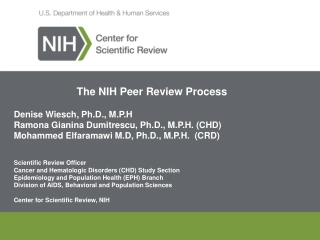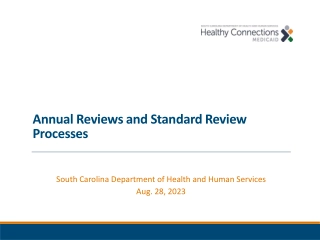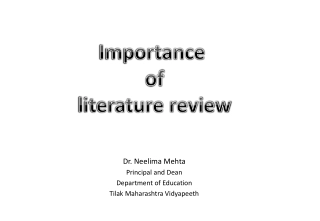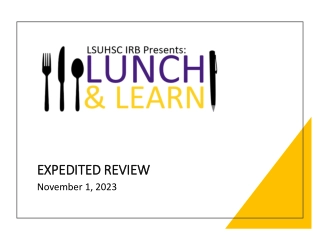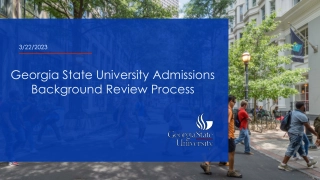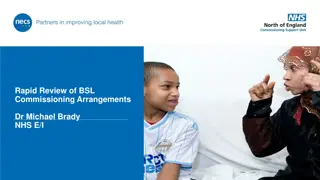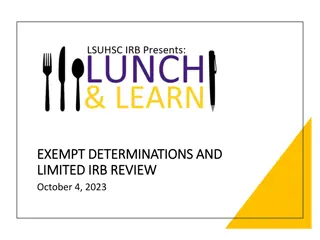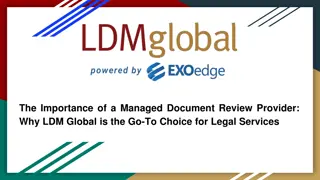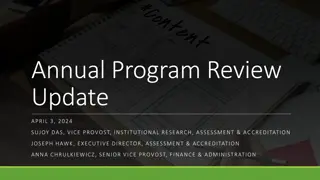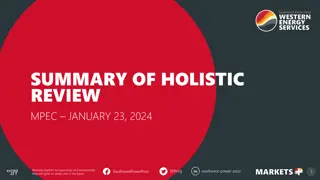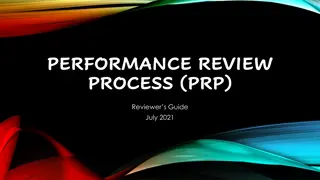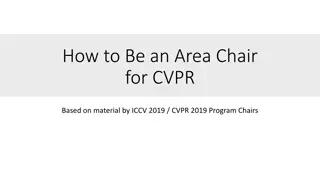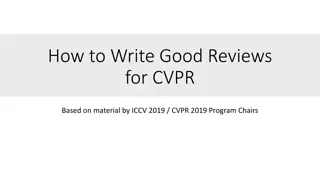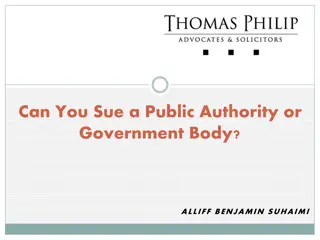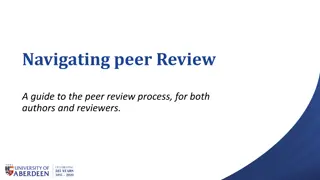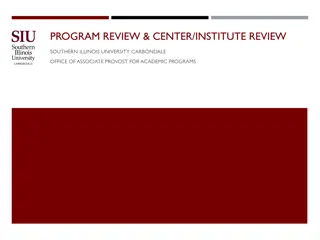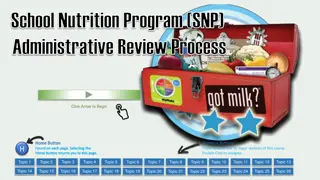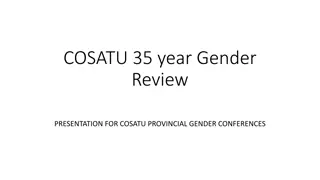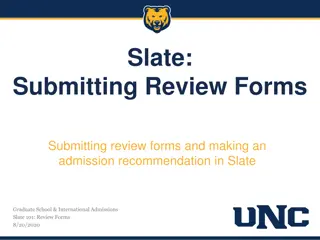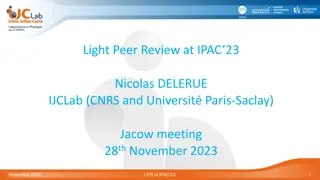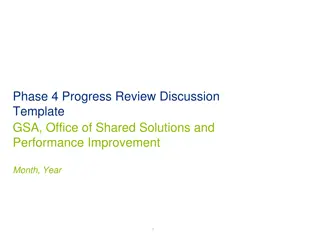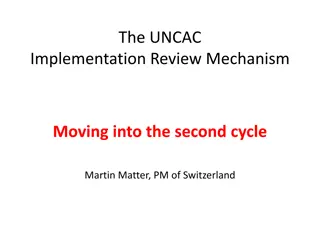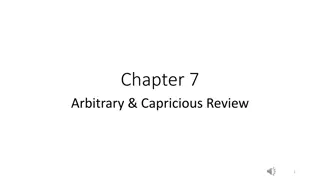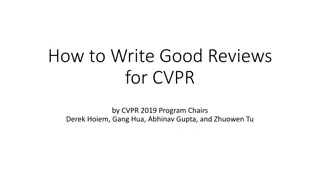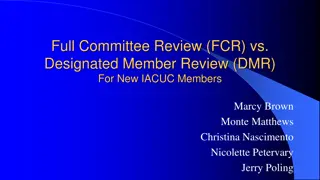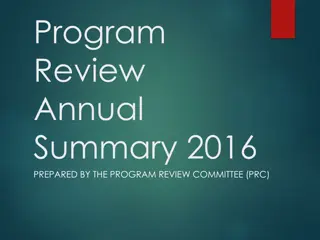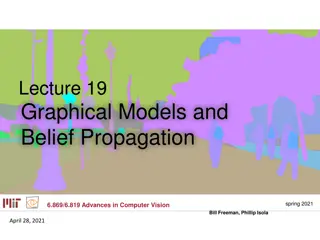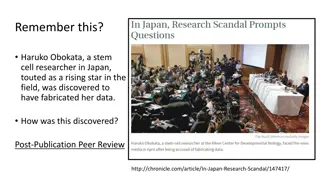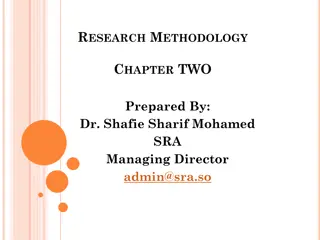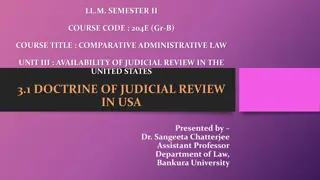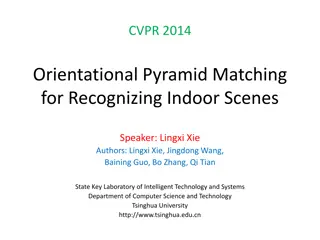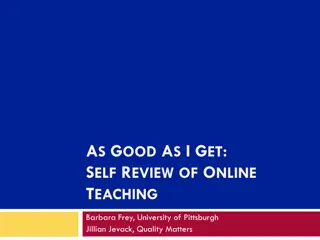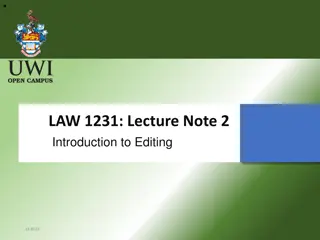The NIH Peer Review Process
The NIH Peer Review Process, including the role of the Center for Scientific Review (CSR) in receiving, referring, and reviewing grant applications. Understand how applications are assigned to institutes or centers and the importance of scientific and technical merit in the review process.
1 views • 18 slides
Annual Reviews and Standard Review Processes
The annual review and standard review processes implemented by the South Carolina Department of Health and Human Services. Stay informed about agency goals, PHE updates and activities, the annual review cycle, the 90-day grace period, and self-service tools available.
4 views • 11 slides
Simplified Review Framework
Simplified review framework for peer review criteria in research project grants, aimed at improving the evaluation process for peer reviewers. The framework will address concerns raised by the extramural community regarding increased complexity and administrative burden in NIH's peer review criteria
1 views • 20 slides
Importance of literature review
A literature review is a critical component of any research endeavor, providing a comprehensive analysis of existing knowledge in a particular field. This review helps in clarifying conceptual issues, understanding research design, persuading examiners, and contributing new insights to the subject a
0 views • 28 slides
Understanding IRB Review Process for Expedited Research
Learn about the significance of IRB review, levels of review, and categories of expedited review. Discover the criteria for IRB review, including whether the study involves human subjects and contributes to generalizable knowledge. Explore the different levels of IRB review and the specific categori
4 views • 11 slides
Georgia State University Admissions Background Review Process
Georgia State University conducts a comprehensive Admissions Background Review (ABR) process to assess applicants' admissibility based on reported information and potential threats to the campus. The ABR Committee evaluates responses to specific admissions background questions, referring cases invol
1 views • 11 slides
Understanding IRB Review Process for Research Studies
The content provides an overview of the IRB review process for research studies, including what necessitates IRB review, the levels of IRB review (exempt, expedited, full board), examples of full board research, and criteria for an Investigational New Drug.
1 views • 17 slides
Rapid Review of BSL Commissioning Arrangements by Dr. Michael Brady
NECS commissioned a Rapid Review of British Sign Language (BSL) service provision to identify areas for improvement in access and patient experience, especially during the Covid-19 pandemic. The review focused on stakeholder engagement, options appraisal for commissioning responsibility, and recomme
9 views • 19 slides
Understanding IRB Review Levels and Exempt Determinations
Explore the levels of IRB review for human participant research, including Exempt, Expedited, and Full Board reviews. Learn about the categories of Exempt Determinations and the criteria for Limited IRB Review. Understand if your study requires IRB review based on research and human subject involvem
1 views • 12 slides
The Importance of a Managed Document Review Provider_ Why LDM Global is the Go-To Choice for Legal Services
In the complex world of legal proceedings, managing vast amounts of data efficiently and accurately is crucial. For law firms and legal departments, the process of document review can be both time-consuming and costly. This is where a managed document review provider, such as LDM Global, plays a piv
2 views • 15 slides
Enhancing Program Performance through Strategic Metrics Review
Explore the annual program review update process focusing on the importance of standardized program metrics, goals of the program performance review, tactical dashboard metrics, and detailed definitions for benchmarking. Learn how a strategic dashboard complements the review process for continuous i
0 views • 20 slides
Summary of Holistic Review of MPEC Tariff
Provide a summary of the holistic review conducted by SPP Staff on the MPEC Tariff, covering both non-substantive and substantive changes made for review and approval by MDWG. The review includes critical dates, tariff outline, updates from working groups/task forces, and a detailed table of content
0 views • 11 slides
Performance Review Process (PRP) Guide for Reviewers - Overview and Tips
This guide aims to assist line managers and reviewers in preparing for performance review meetings. It covers the objectives of the CRGPA performance review process, key stages in the process, discussion areas, top tips for planning, and an overview of the performance review process. Emphasizing on
1 views • 26 slides
Insights from Surveys on Peer Review & Peer Feedback in Scholarly Communication
Results from surveys on peer review and peer feedback provide valuable insights into the demographics, general attitudes, and major challenges faced in scholarly communication. The data reveals respondent demographics, overall satisfaction with peer review systems, and prevalent problems in current
0 views • 13 slides
Guidelines for Being a CVPR Area Chair Based on ICCV 2019 & CVPR 2019
Serving as an Area Chair for CVPR involves making transparent decisions for the community, ensuring consistency, and handling critical paper evaluations. The decision process includes assigning papers to reviewers, managing reviews, discussions, rebuttals, and final decisions. Area Chairs play a cru
1 views • 17 slides
Guidance on Writing Effective Reviews for CVPR - Insights from ICCV 2019 & CVPR 2019 Program Chairs
Providing quality reviews is crucial for the success of CVPR. Helpful reviews assist area chairs in making informed decisions, aid authors in receiving constructive feedback, and benefit the community by ensuring valuable papers are accepted. Conversely, poorly written reviews can have negative cons
0 views • 19 slides
Understanding Judicial Review in Suing Public Authorities
Judicial review is the inherent right of courts to review decision-making processes of public bodies. It allows for challenging and analyzing decisions, granting public law remedies like declaration, certiorari, mandamus, prohibition, and quo warranto. Those adversely affected by public duty actions
0 views • 13 slides
Navigating Peer Review: A Comprehensive Guide for Authors and Reviewers
In academic publishing, peer review plays a crucial role in maintaining publication quality. This guide offers a detailed overview of the peer review process for both authors and reviewers, covering topics such as receiving review invitations, manuscript submission, writing effective reviews, and mo
0 views • 31 slides
Southern Illinois University Carbondale Office of Associate Provost for Academic Programs Review
The Program Review & Center/Institute Review at Southern Illinois University Carbondale aims to educate attendees on IBHE requirements, the review process, conflict of interest policies, self-study writing, on-site review involvement, financial support, and available resources. The IBHE mandates rev
0 views • 37 slides
School Nutrition Program (SNP) Administrative Review Process
The School Nutrition Program (SNP) Administrative Review Process is a vital aspect of ensuring compliance with National School Lunch Program (NSLP) and School Breakfast Program (SBP) requirements. This process involves assessing critical areas of review and general accountability to maintain program
2 views • 70 slides
COSATU 35-Year Gender Review Presentation for Provincial Conferences
This presentation provides an overview of the COSATU Gender Review, focusing on statistical analysis of gender and employment trends from 1985 to 2021, women's leadership statistics in COSATU provinces and affiliates, and key findings from surveys of COSATU affiliates and NGC delegates. It aims to r
0 views • 47 slides
Slate Graduate School & International Admissions Review Forms Overview
Explore the process of submitting review forms and making admission recommendations in Slate Graduate School & International Admissions, including automatic assignment of applications to queues, review of Staff Review Forms, and recommending admission or denial through Faculty Review Forms. Learn ab
0 views • 8 slides
Understanding the California Supreme Court Review Process
Explore the workings of the California Supreme Court in considering petitions for review, filing statistics, and the challenges faced by litigants seeking review. Learn about the criteria for selecting petitions, filing statistics, and client considerations in pursuing a petition. Discover the small
0 views • 14 slides
Light Peer Review at IPAC'23 Organized by IN2P3: Details and Guidelines
Light Peer Review (LPR) at IPAC'23 organized by IN2P3 aims to enhance the academic reputation of accelerator research, train students in peer-review processes, and elevate the impact factor of publications. The event has strict acceptance criteria ensuring the quality and originality of the work, wi
0 views • 22 slides
Phase 4 Progress Review Discussion Template Overview
This template guides a Progress Review discussion involving a Customer, Provider, and Key Stakeholders. It addresses the gaps in common business requirements, risk assessment confidence, deployment readiness, budget impacts, migration costs, and more. The template provides instructions for completin
0 views • 25 slides
Understanding Judicial Review in Administrative Law
In this chapter, the concept of judicial review in administrative law is explored, focusing on the scope of review set by Congress, including trial de novo and independent judgment on evidence. Different standards of review, such as clearly erroneous and substantial evidence, are discussed, highligh
0 views • 23 slides
UNCAC Implementation Review Mechanism: Moving Towards the Second Cycle
The UNCAC Implementation Review Mechanism is progressing into its second cycle, with a focus on evaluating challenges and terms of reference at the conclusion of each review cycle. The performance assessment has highlighted achievements in enhancing awareness and involvement of civil society/private
0 views • 7 slides
Understanding Arbitrary and Capricious Review in Administrative Law
Arbitrary and Capricious Review refers to a highly deferential standard applied to agency decisions, requiring agencies to demonstrate compliance with statutory requirements. The landmark case of Citizens to Preserve Overton Park v. Volpe set the precedent for a thorough judicial review based on the
0 views • 8 slides
Mastering the Art of Writing Good Reviews for CVPR
Embrace the significance of your role as a reviewer, understand the paper decision process, learn how to structure effective reviews with examples, and gain valuable tips to enhance your reviewing skills. Your reviews impact career advancement, authors' experiences, and community knowledge dissemina
0 views • 15 slides
Global Peer Review Activities and Future Plans Overview
This document highlights the recent peer review activities conducted by the Subcommittee on Peer Review, focusing on the accomplishments and upcoming plans for enhancing peer review processes. It includes insights from the Global Flyer Survey, training programs, and the development of guidelines, al
0 views • 3 slides
Understanding Full Committee Review (FCR) vs. Designated Member Review (DMR) for New IACUC Members
Explore the differences between Full Committee Review (FCR) and Designated Member Review (DMR) for new IACUC members. Learn the acceptable methods of protocol review, federal requirements, member responsibilities, risks, and best practices for protocol approval. Dive into the two valid methods of IA
1 views • 23 slides
Program Review Annual Summary 2016 by PRC Committee
The Program Review Annual Summary 2016, prepared by the Program Review Committee (PRC), presents a detailed review of instructional programs and administrative units at the College. The report outlines the purpose of the annual review, the themes and issues identified, and recommendations for improv
0 views • 13 slides
Graphical Models and Belief Propagation in Computer Vision
Identical local evidence can lead to different interpretations in computer vision, highlighting the importance of propagating information effectively. Probabilistic graphical models serve as a powerful tool for this purpose, enabling the propagation of local information within an image. This lecture
0 views • 50 slides
Uncovering Fabricated Data in Stem Cell Research: The Haruko Obokata Scandal
Haruko Obokata, a promising stem cell researcher in Japan, faced allegations of data fabrication, leading to a significant research scandal. Post-publication peer review platforms like PubPeer, PubMed Commons, F1000 Research, and ResearchGate Open Review play vital roles in detecting and addressing
0 views • 11 slides
Effective Strategies for Conducting a Literature Review in Research Methodology
Understanding the importance of literature review in research methodology, this chapter discusses the objectives, aims, and guidelines for writing a comprehensive literature review. It emphasizes the significance of identifying gaps in existing knowledge, structuring the review, and organizing infor
0 views • 33 slides
Understanding the Doctrine of Judicial Review in the United States
Judicial Review is a crucial power of the judiciary to review the constitutionality of laws and executive orders. This article explores the origin of Judicial Review in the United States, focusing on the landmark case of Marbury v. Madison. It delves into the concept, importance, and application of
0 views • 14 slides
Orientational Pyramid Matching for Indoor Scene Recognition at CVPR 2014
This presentation at CVPR 2014 introduces Orientational Pyramid Matching for recognizing indoor scenes. The speaker, Lingxi Xie, along with other authors, presents the Bag-of-Feature Model and its experimental results. The focus is on scene recognition and the importance of image understanding in va
0 views • 39 slides
Collaborative Global-Local Networks for Memory-Efficient Segmentation of Ultra-High Resolution Images
This research project presented at CVPR 2019 by Wuyang Chen, Ziyu Jiang, Zhangyang Wang, Kexin Cui, and Xiaoning Qian focuses on memory-efficient segmentation of ultra-high resolution images using Collaborative Global-Local Networks. The study explores the benefits of employing two branches for deep
0 views • 12 slides
Enhancing Online Teaching Through Self-Review: Challenges and Benefits
Explore the self-review process of online teaching, including identifying challenges, benefits, and different types of reviews. Learn about developing an effective review guide, promoting collegiality, and facilitating professional development in online teaching. Discover the components of a review
0 views • 23 slides
Peer Review Process in Academic Editing
Explore the importance of peer review in academic and professional development, focusing on improving writing skills and critical evaluation. Learn about the benefits of peer review, ways to effectively review work, and various modes of assessment. Understand the peer review process and how it enhan
0 views • 29 slides
